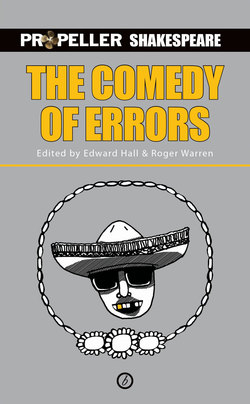Читать книгу The Comedy of Errors (Propeller Shakespeare) - William Shakespeare - Страница 10
На сайте Литреса книга снята с продажи.
ОглавлениеFarce And Humanity:
The Comedy of Errors
The Comedy of Errors was performed, presumably by Shakespeare’s company, at Gray’s Inn on 28 December 1594. Was it then a new play? The London theatres were closed, because of a virulent outbreak of the plague, from July 1592 to April 1594, during which time Shakespeare wrote his two narrative poems; he may also have written Errors at that time, ready for performance when the theatres reopened. Errors used to be regarded as an even earlier work, perhaps written for local performance before he left Stratford; but this view reflected a low estimate of the play, and modern performances have shown it to be a brilliant piece of theatrical mechanism; it is hard to see how this could have been achieved without the experience of working in the professional theatre.
Shakespeare’s main source is the Menaechmi by the classical dramatist Plautus; but he made substantial changes. To begin with, he gave the twin masters of the Menaechmi twin servants, thus doubling the potential for confusion and mistaking. Then he moved the setting from Epidamnum to Ephesus, which was famous – or notorious – in the ancient world, and in the Bible, as a centre of witchcraft, so that Antipholus of Syracuse half-expects strange things to happen to him.
But Shakespeare’s most crucial, and most personal, changes modify the tone of his original. He enclosed the central confusions within a framework – the story of Aegeon and his ultimate reunion with his wife and family – taken from a very different kind of story, the legend of Apollonius of Tyre, to which he returned at the end of his career in Pericles. Still more significant, he introduced an element of romance into the mistakings, in the wooing of Luciana by Antipholus of Syracuse, where the language looks forward to his later comedies, and connects with his own love poetry in the Sonnets. Antipholus calls Luciana ‘mine own self’s better part’, a phrase which echoes Shakespeare’s calling his lover ‘the better part of me’ in Sonnets 39 and 74. His interest in twins, both here and in Twelfth Night, may also derive from personal considerations. He was the father of twins, and this may have informed Antipholus of Syracuse’s sense of loss and personal disorientation when separated from his twin:
I to the world am like a drop of water
That in the ocean seeks another drop,
Who falling there to find his fellow forth,
Unseen, inquisitive, confounds himself.
So I, to find a mother and a brother,
In quest of them, unhappy, lose myself.
The Comedy of Errors is technically a farce; but one of the most interesting aspects of farce is how painful it often is, how often the audience is invited to laugh at other people’s misfortunes, as in the repeated beating of the Dromios or Adriana’s sense of marital betrayal. But again, Shakespeare has it both ways: the scene in which Adriana pours out her resentment to the wrong Antipholus is a perfect example of comedy of mistaking; but at the same time we feel for her in her unhappiness. So with the play’s treatment of money. Like its Plautine original, Errors takes place in a primarily mercantile society, symbolised by the theatrical props: Antipholus’ bag of gold, and especially the golden chain which leads to so many of the confusions in the second half of the play. And yet the topic of money may serve to indicate the distance that Shakespeare has travelled from his rather inhuman Plautine model, most obviously in the final scene of each play. In Menaechmi, the equivalent of Antipholus of Ephesus offers his wife for sale; Errors ends with the warmth and reconciliation of a multiple family reunion.
Roger Warren
